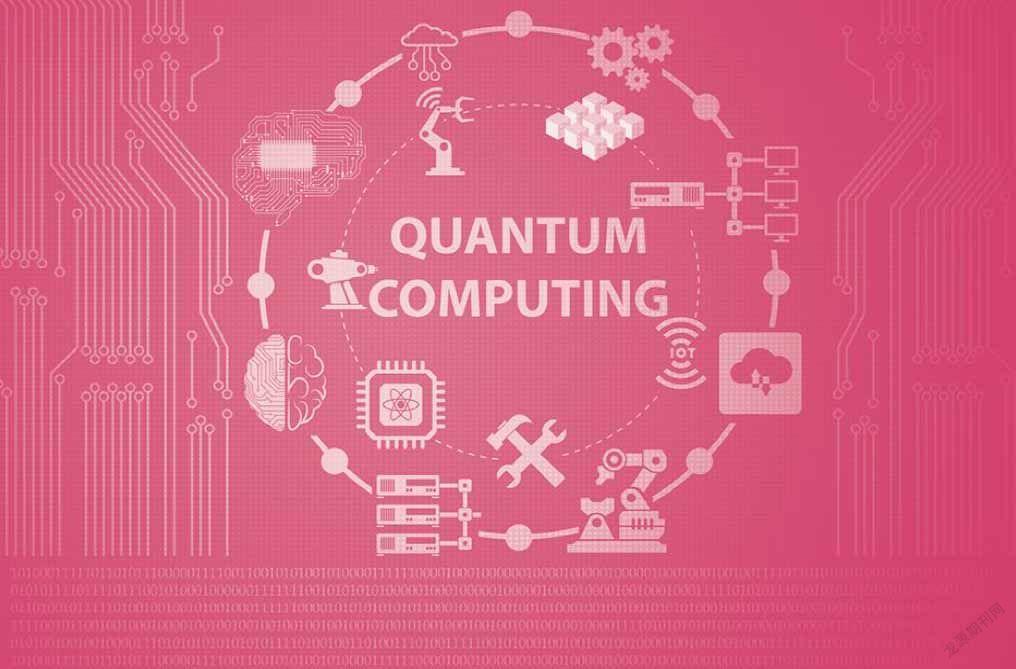Forget Trade War, China Wants to Win the Computing Arms Race 贸易战靠边,中国要在计算领域领先
苏珊·德克尔 克里斯托弗·亚西耶科 赵根宗


As the US and China threaten to impose tariffs on goods from aluminum to wine, the two nations are waging a separate economic battle that could determine who owns the next wave of computing.
Chinese universities and US technology companies such as International Business Machines Corp. and Microsoft Corp. are racing to develop quantum computers, a type of processing that’s forecast to be so powerful it can transform how drug-makers, agriculture companies and auto manufacturers discover compounds and materials.
Quantum computing uses the movement of subatomic particles to process data in amounts that modern computers can’t handle. Mostly theoretical now, the technology is expected to be able to perform calculations that make today’s computers look akin to1 an abacus.
While overall spending by China is unknown, its government is building a $10 billion National Laboratory for Quantum Information Sciences in Hefei, Anhui province, which is slated to open2 in 2020. United States-funded research in quantum is about $200 million a year, according to a July 2016 government report, and some researchers and companies don’t believe that’s enough.
One “killer app” 3 may be encryption, the code scrambling technology that secures modern global commerce and communications. China, Chinese universities and western financial institutions are rushing to patent more ways to use quantum technology for encryption, a study by research firm Patinformatics found.
“We’re talking about encrypting data so it can’t be broken, certainly not by a classical computer,” said Tony Trippe, managing director of Dublin, Ohio-based Patinformatics. “It would be an unhackable system.”
At the same time, it could break encryption that was on a classical computer. “An organization or a nation that had quantum computer technologies would have a significantly easier time of wreaking havoc on other systems,” he said.
China has also been aggressive in pushing homegrown innovation as it supports companies in obtaining patents and trademarks around the world, and has increased its research funding. In its annual scorecard, the Organization for Economic Cooperation and Development called China “the second-largest scientific powerhouse,” behind the US.
“Over time, quantum in the field of computation is so important that it will redefine the category of computers themselves,” said Dario Gil, vice president of IBM’s Artificial Intelligence research. “It is the future of computing.”
Intel Corp., which started its own program two years ago, said the technology promises to be “transformational.”
“There are many tough problems to solve before quantum computing is a commercial reality,” said Jim Clarke, director of quantum hardware at Intel. “Some of these problems involve materials science, quantum chip design and manufacturing—those are sweet-spot4 problems for Intel.”
While there will still be a place for what’s being called “classical computers”—a category that include modern smartphones and even super computers—the quantum computers could have “an infinite number of applications” in the fields of life sciences, chemistry and agriculture, IBM’s Gil said.
It’s too early to say which company or country will be the leader in quantum computers, though at this stage it looks like US companies will excel in hardware, while Chinese and Japanese ones are focused on the software and applications, Patinformatics’ Trippe added.
The US-China Economic and Security Review Commission, created by Congress in 2000 to assess national security implications of bilateral trade between the countries, said in its report that China “has closed the technological gap” with the US in quantum information science, a sector Americans have long dominated, “due to a concerted strategy by the Chinese government and inconsistent and unstable levels of R&D funding and limited government coordination by the United States.”
Studies by the US Chamber of Commerce and Bloomberg have independently shown that China is rising in its overall score for innovation, which includes education, government research and the number of patents. The World Intellectual Property Organization reported that China is closing in on the United States in filing international patent applications.
The Chinese researchers are focused on encryption, based on their patent applications. In August 2016 China’s state news agency said the government had launched the world’s first quantum communications satellite, and a year later claimed to have sent the first “unbreakable” code from space.
In the US, the Department of Energy, Naval Research Lab and defense contractor Northrop Grumman Corp. are among the government entities or contractors researching quantum computers. Overall, though, the US government has cut back on5 its own funding of computing and cryptography hardware, Dowling said.
In the coming age of quantum, it’s an open question whether federal funding will enable the US to maintain the edge it’s had during the PC era and smartphone wars. Scott Crowder, IBM’s chief technology officer for quantum computing, told that “the US government investment in driving this critical technology is not sufficient to stay competitive.”
“What we’re seeing is a bunch of different things going on at once with no overall organization,” said Jonathan Dowling, co-director of Louisiana State University’s Hearne Institute for Theoretical Physics, “unlike in China, where they are exactly sure what they’re doing.”
在威胁要对铝材、葡萄酒等各种商品加征关税之际,中美两国在进行着另一场经济战,而这场战役有可能决定谁将掌控下一波计算浪潮。
中国的高校和美国国际商用机器公司(IBM)、微软等科技企业正在竞相研发量子计算机,这种数据处理方式预计性能非常强大,足以革新制药企业、农业公司和汽车制造商发现化合物和材料的方式。
量子计算利用亚原子粒子的运动来处理现代计算机无法应对的大量数据。虽然这项技术现在还基本处于理论阶段,但是预计其计算能力会让今天的计算机看起来像算盘。
尽管不知道中国的总体支出,但中国政府正在安徽省合肥市斥资100亿美元修建一个量子信息科学国家实验室,计划于2020年启用。而根据2016年7月的一份政府报告,美国每年量子研究的经费大约为2亿美元,一些研究人员和企业认为这还不够。
量子计算中一个“杀手级程序”可能是加密,这项代码置乱技术能够保护现代全球商业和通信。调查公司Patinformatics的一项研究发现,中国政府及高校和西方金融机构急于獲得更多使用量子技术进行加密的技术专利权。
Patinformatics公司总部位于俄亥俄州都柏林,该公司总经理托尼·特里普说:“我们谈论的是数据加密,这样不会被破解,尤其不会被传统计算机破解。它将是不可破解的系统。”
同时,它可以破解传统计算机上的加密。他说:“一个组织或国家如果拥有量子计算机技术,就可以很轻松地破坏其他系统。”
中国积极推动本土创新,同时支持企业在世界各地获得专利和商标,并增加了研究经费。经合组织在其年度排行榜中称中国是仅次于美国的“第二大科学强国”。
IBM人工智能研究部副总裁达里奥·吉尔说:“随着时间的推移,计算领域的量子技术将非常重要,会重新定义计算机本身的类别。它代表计算领域的未来。”
英特尔公司两年前就开始了自己的项目,该公司表示,这项技术有望“带来巨变”。
“量子计算要实现商业化,还有许多难题需要解决。”英特尔量子硬件主管吉姆·克拉克表示,“其中一些问题涉及材料科学、量子芯片设计和制造,这些都是英特尔面临的热点问题。”
IBM的吉尔说,现在所谓的“传统计算机”——包括现代智能手机甚至超级计算机——仍将有一席之地,而量子计算机在生命科学、化学和农业领域可能有“无限多的应用”。
Patinformatics公司的特里普补充道,现在说哪个公司或国家将成为量子计算机的领头羊还为时过早,尽管在这个阶段,看起来美国公司在硬件方面会很出色,而中国和日本公司则专注于软件和应用。
美国国会在2000年成立中美经济与安全评估委员会,评估中美双边贸易对国家安全的影响。该委员会在报告中称,在美国长期占据统治地位的量子信息科学领域,“由于中国政府在战略上协调一致,而美国投入的研发经费水平不稳定,并且政府协调力度有限”,中国“已经缩小了与美国的技术差距”。
美国商会和彭博社各自进行的研究都显示,中国创新的总体得分不断提高,其中包括教育、政府资助的研究和专利数量。世界知识产权组织报告说,中国的国际专利申请数量正在接近美国。
从中国研究人员申请专利的情况看,他们把重点放在加密技术上。2016年8月,中国官方通讯社称中国发射了世界首枚量子通信卫星,一年后又宣称从太空发送了第一个“无法破解的”代码。
美国研究量子计算机的政府实体或承包商中包括能源部、海军研究实验室和国防承包商诺斯罗普格鲁曼公司。但总体而言,道林表示,美国政府已经削减了对计算机和加密硬件的投资。
在即将到来的量子时代,联邦政府投资是否能使美国保持在个人电脑时代和智能手机竞争中的优势,这个问题尚无定论。IBM负责量子计算的首席技术官斯科特·克劳德表示,“美国政府在推动这项关键技术方面的投资不足以保持其竞争力”。
路易斯安那州立大学赫恩理论物理研究所联合主管乔纳森·道林说:“我们看到的局面是,一系列不同的项目同时开展,但是缺乏整体组织。中国则不同,他们很明确自己在做什么。” □
(译者单位:浙江万里学院)

